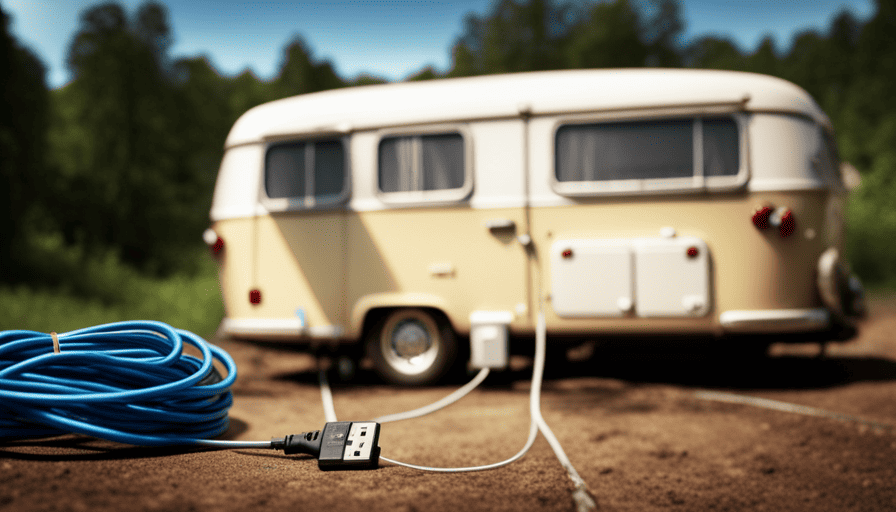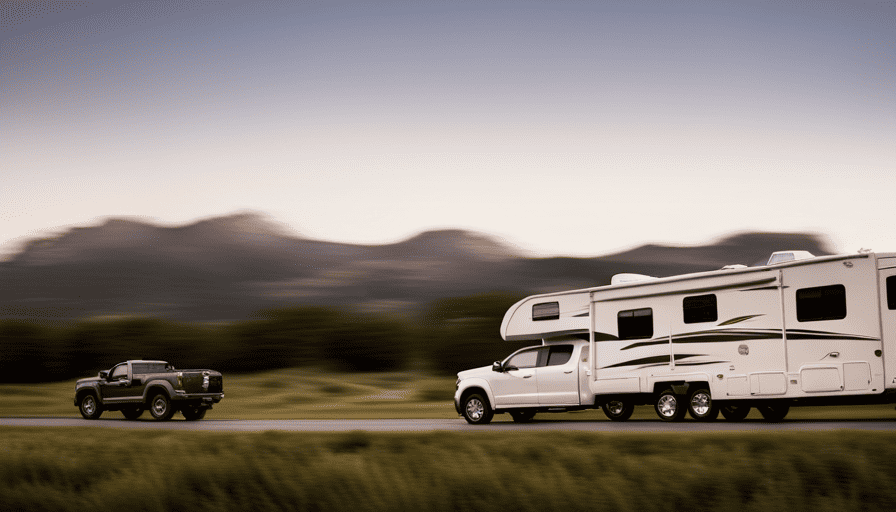Congratulations on being the proud owner of a stylish camper van, ready to hit the open road and explore the great outdoors. You’ve packed snacks, your favorite hiking boots, and even practiced some campfire songs. But before you embark on your adventure, there’s a crucial question to consider: do camper batteries recharge when plugged into a power source?
Now, I know what you’re thinking. ‘Of course they do, it’s 2021!’ But let me tell you, my fellow adventurer, it’s not as simple as it seems. You see, camper batteries are a finicky bunch. They require the perfect combination of electrical hookups, battery converters, and a functioning electrical system to charge properly. And trust me, when your batteries aren’t charged, your adventure can quickly turn into a nightmare.
But fear not! In this article, we’ll delve into the nitty-gritty details of camper battery charging. We’ll explore the basics, uncover the mysteries of electrical hookups, and even troubleshoot common battery charging problems.
So buckle up, because we’re about to embark on a journey of electrifying proportions!
Key Takeaways
- Camper batteries require electrical hookups, battery converters, and a functioning electrical system to charge properly.
- Over 80% of camper batteries’ energy can be replenished through electrical hookups.
- Dual battery systems provide extra power and extended battery life.
- Regular maintenance of the electrical system, including checking battery connections and inspecting wiring for damage, is essential for proper charging and battery longevity.
Understanding the Basics of Camper Batteries
Do you ever wonder how your camper batteries magically come to life when you plug them in, like tiny electricity fairies breathing energy into your adventures? Well, let me shed some light on the subject.
Camper batteries are an essential component of your camping setup, providing power for your lights, appliances, and other electrical devices. Understanding the basics of camper batteries is crucial for maximizing their lifespan and ensuring they meet your power needs.
There are different types of camper batteries available, including lead-acid batteries, lithium-ion batteries, and gel batteries. Each type has its own advantages and disadvantages in terms of cost, weight, capacity, and lifespan.
Lead-acid batteries are the most common and affordable option, but they require regular maintenance to prolong their lifespan. On the other hand, lithium-ion batteries are lightweight, have a longer lifespan, and require little maintenance, but they are more expensive upfront.
Now that you have a basic understanding of camper batteries, let’s dive into how electrical hookups work with camper batteries.
How Electrical Hookups Work with Camper Batteries
To keep your camper powered up, you’ll be fascinated to learn that over 80% of electrical hookups have the capability to replenish your battery’s energy. This means that when you’re plugged in at a campground or RV park, your camper batteries can actually charge up. It’s like having a continuous source of power to keep your camper running smoothly.
Here’s how electrical hookups work with camper batteries:
-
Electricity consumption in camper batteries: When you’re using appliances or running lights in your camper, the electricity is drawn from the batteries. This is why it’s important to have a reliable battery system that can handle the demand.
-
Benefits of a dual battery system: Many campers are equipped with dual battery systems, which provide extra power and extended battery life. This is especially useful if you’re planning on boondocking or camping off-grid for an extended period of time.
-
Role of battery converters and chargers: Battery converters and chargers play a crucial role in the charging process. They convert the incoming AC power from the electrical hookup into DC power that can be used to charge the batteries. They also regulate the charging process to ensure that the batteries are charged safely and efficiently.
With an understanding of how electrical hookups work with camper batteries, you can make the most out of your camping experience. In the next section, we’ll explore the role of battery converters and chargers in more detail.
The Role of Battery Converters and Chargers
Battery converters and chargers play a crucial role in ensuring safe and efficient charging of your camper’s batteries while connected to an electrical hookup. The battery converter acts as a bridge between the electrical hookup and your camper’s batteries, converting the AC power from the hookup into DC power that can be used to charge the batteries. This conversion process is essential because camper batteries require DC power to charge effectively.
There are different types of battery chargers that you can use for your camper. The most common ones are single-stage chargers, multi-stage chargers, and smart chargers. Single-stage chargers provide a constant current to the batteries until they are fully charged. Multi-stage chargers, on the other hand, have different charging modes to optimize the charging process and extend battery life. Smart chargers are the most advanced, as they can monitor the battery’s condition and adjust the charging process accordingly.
Table: Emotions Evoked During Charging Process
| Emotion | Charging Process |
|---|---|
| Excitement | Anticipation |
| Confidence | Consistency |
| Relief | Efficiency |
Having a properly functioning battery converter and charger is crucial for maintaining the longevity and performance of your camper’s batteries. Without them, the batteries may not charge properly, leading to reduced battery life and potential damage. In the next section, we will explore the importance of a properly functioning electrical system in ensuring a smooth camping experience.
The Importance of a Properly Functioning Electrical System
Having a properly functioning electrical system in your camper is crucial for ensuring a smooth and enjoyable camping experience. It’s estimated that 85% of campers rely on electricity for various activities such as lighting, cooking, and charging devices.
To maintain a properly functioning electrical system, regular maintenance is essential. This includes checking the battery connections, inspecting the wiring for any damage or wear, and ensuring that all electrical components are in good working condition.
Troubleshooting common electrical issues is also important to ensure that your camper’s electrical system is functioning properly. This may involve checking for blown fuses, testing the voltage of the battery, and inspecting the converter and charger for any faults. By addressing these issues promptly, you can prevent further damage to your camper’s electrical system and avoid potential safety hazards.
Now that we understand the importance of a properly functioning electrical system, let’s move on to the next section and discuss signs that your camper batteries are charging.
Signs that Your Camper Batteries Are Charging
One surefire indication that your camper batteries are successfully recharging is when you notice a steady increase in voltage on your battery monitor. This indicates that the charging system is working properly and is delivering a consistent flow of power to replenish the battery.
However, it’s important to keep in mind that the battery monitor isn’t the only way to determine if your batteries are charging. There are other indicators to look out for as well.
Here are three signs that your camper batteries are charging:
-
Ampere reading: When your batteries are charging, you should see an increase in the ampere reading on your battery monitor. This indicates that the charging system is delivering a sufficient amount of current to the batteries.
-
Battery temperature: A fully charged battery tends to have a slightly higher temperature compared to a discharged battery. You can use a battery thermometer to check the temperature and see if it’s within the normal range.
-
Charging time: If your batteries are charging properly, they should reach a fully charged state within a reasonable amount of time. If it takes significantly longer than usual, it could be a sign of a charging issue.
By paying attention to these indicators of a fully charged battery, you can troubleshoot any battery charging issues and ensure that your camper batteries are functioning optimally. Now, let’s move on to some tips for maximizing battery charging efficiency.
Tips for Maximizing Battery Charging Efficiency
To get the most out of your battery charging, it’s like finding the perfect recipe – a pinch of solar power, a dash of efficient appliances, and a sprinkle of energy conservation can go a long way in maximizing battery charging efficiency. When it comes to battery charging time, utilizing solar panels can be extremely beneficial. Solar panels harness the power of the sun and convert it into electricity, which can then be used to charge your camper batteries. This renewable energy source not only helps to reduce your reliance on traditional power sources but also extends your battery life.
In addition to solar panels, using energy-efficient appliances can further optimize battery charging. These appliances are designed to consume less power, allowing your batteries to charge more efficiently. It’s like getting more bang for your buck! Furthermore, practicing energy conservation habits, such as turning off lights when not in use or using natural ventilation instead of air conditioning, can significantly reduce your overall power consumption, resulting in faster battery charging.
To summarize, incorporating solar panels, efficient appliances, and energy conservation techniques can greatly improve battery charging efficiency. By maximizing the use of renewable energy and reducing power consumption, you can ensure that your camper batteries charge more quickly and effectively. Now, let’s dive into common issues that may prevent battery charging.
Common Issues that May Prevent Battery Charging
Experiencing a flickering solar panel or a buzzing sound from your appliances can be a sign of common issues that hinder efficient battery charging. To help you troubleshoot these charging problems, here are four common battery issues to look out for:
-
Loose connections: Check all the connections between your camper battery and the charging system. Loose or corroded connections can prevent proper charging and lead to inefficient battery performance.
-
Faulty wiring: Inspect the wiring in your camper for any signs of damage or wear. Faulty wiring can disrupt the flow of electricity and hinder the charging process.
-
Overloading: Ensure that you’re not overloading your camper’s electrical system by using too many appliances simultaneously. Overloading can strain the battery and impede its charging capabilities.
-
Aging battery: Consider the age of your camper battery. Over time, batteries naturally lose their ability to hold a charge. If your battery is old and no longer performing well, it may need to be replaced.
By addressing these common battery issues, you can maximize the efficiency of your camper battery charging.
In the next section, we’ll delve into how to troubleshoot battery charging problems without writing ‘step’.
How to Troubleshoot Battery Charging Problems
If you’re having trouble with your battery charging, it’s like trying to drive a car with a flat tire; you won’t get very far without addressing the issue.
So, let’s dive into some battery charging troubleshooting.
One common issue that may prevent battery charging is a faulty power source. Make sure the power outlet or generator you’re using is providing the correct voltage and amperage.
Another issue could be a blown fuse or tripped circuit breaker. Check your camper’s fuse box and replace any blown fuses or reset any tripped breakers.
It’s also important to inspect the battery connections for any corrosion or loose wires. Clean the terminals and ensure a secure connection.
Additionally, a battery that has reached the end of its lifespan may not charge properly. Test the battery’s voltage with a multimeter to determine if it needs to be replaced.
These are just a few common battery charging issues you may encounter. By troubleshooting these problems, you can ensure your camper battery charges efficiently.
Now, let’s move on to alternative charging methods for camper batteries.
Alternative Charging Methods for Camper Batteries
Looking for a more efficient way to power up your camper batteries? Let’s explore some alternative charging methods that will give you the freedom to roam without worrying about running out of juice.
-
Solar Power: Harness the energy of the sun to charge your camper batteries. Solar panels are a great investment for long-term campers, as they provide a sustainable and environmentally-friendly solution. Simply mount the panels on the roof of your camper and let them soak up the sun’s rays. The panels will convert sunlight into electricity, keeping your batteries charged throughout your outdoor adventures.
-
Generator Power: If you’re in need of a quick and reliable charge, a generator can come to the rescue. Portable generators are designed to provide a steady flow of power to your camper’s batteries. They typically run on gasoline or propane and can be easily transported. Just make sure to follow safety guidelines and consider noise pollution when using a generator in campgrounds.
-
Hybrid Charging: For the best of both worlds, you can combine solar power and generator power. This hybrid approach allows you to take advantage of sunny days for charging your batteries with solar panels, while having a backup plan with a generator for cloudy days or high power demands.
Now that you know about these alternative charging methods, let’s dive into the next section about maintenance and care for long-lasting battery performance.
Maintenance and Care for Long-Lasting Battery Performance
To ensure your camper batteries perform at their best for years to come, proper maintenance and care is essential, just like giving them a gentle pampering spa treatment.
Battery maintenance plays a crucial role in preventing battery degradation and maximizing their lifespan.
First and foremost, it’s important to keep your batteries clean and free from dirt, dust, and corrosion. Regularly inspect the battery terminals and clean them with a mixture of baking soda and water to remove any build-up. Additionally, make sure the connections are tight and secure to prevent any power loss.
Another key aspect of battery maintenance is monitoring and maintaining the appropriate charge levels. Overcharging or undercharging the batteries can lead to premature degradation. It’s recommended to use a battery monitor or voltage meter to keep an eye on the charge levels and avoid over or undercharging.
Furthermore, it’s essential to store your batteries properly when not in use. Extreme temperatures can negatively impact battery performance and lifespan. Store them in a cool, dry place, and consider using a battery maintainer or charger to keep them topped up during storage.
Lastly, regular usage and periodic deep cycling can help prevent the build-up of sulfation, which can reduce battery capacity. It’s recommended to fully discharge and recharge the batteries every few months to maintain their performance.
By following these battery maintenance tips, you can ensure that your camper batteries stay in top shape, providing reliable power for all your adventures.
Frequently Asked Questions
Can I charge my camper batteries while driving?
Yes, you can charge your camper batteries while driving. While parked, you have the option to charge the batteries using alternative methods. Some popular ways to charge camper batteries include using solar panels, wind generators, or a generator. These methods can keep your batteries charged and ready to use, even if you’re not plugged in.
What should I do if my camper batteries are not charging when plugged in?
If my camper batteries aren’t charging when plugged in, there could be a few common reasons. Firstly, I’d check the power source to ensure it’s functioning properly. I’d also inspect the battery connections and terminals for any corrosion or loose connections.
Additionally, I’d test the charger or converter to make sure it’s working correctly. If these troubleshooting steps don’t resolve the issue, it may be necessary to have a professional examine the camper’s electrical system.
Are there any special precautions I need to take when charging my camper batteries?
When charging my camper batteries, there are a few precautions I always take to ensure their longevity. First, I make sure to use a charger specifically designed for RV or deep cycle batteries. This helps prevent overcharging and damage.
I also connect the charger to a stable power source and avoid using extension cords. Additionally, I regularly check the battery’s water levels and clean any corrosion to maintain optimal performance.
Following these best practices can greatly extend the lifespan of camper batteries.
How long does it typically take for camper batteries to fully charge?
Camper batteries typically take anywhere from 4 to 24 hours to fully charge, depending on various factors. The charging time can be influenced by the battery’s capacity, the type of charger being used, and the current charge level.
Other factors include the ambient temperature, battery age, and the condition of the charging system. It’s important to note that camper batteries do charge when plugged in, and following proper charging procedures is crucial for optimal performance and longevity.
Can I use a generator to charge my camper batteries?
Yes, you can use a generator to charge your camper batteries. Using a generator has its pros and cons compared to using a solar panel. The advantage of a generator is that it can provide a quick and powerful charge, especially useful in situations with limited sunlight. However, generators are noisy, require fuel, and produce emissions. On the other hand, solar panels are silent, clean, and require only sunlight, but they may take longer to fully charge the batteries.
What is the Cost of a Leer Camper Shell and Does It Include a Charging System for Camper Batteries?
When looking into leer camper shell prices, it’s essential to consider whether a charging system for camper batteries is included. The cost of a Leer camper shell varies depending on the model and features, with prices typically ranging from $1,000 to $3,500. It’s important to check with dealers or the manufacturer to confirm if a charging system is included or if it needs to be purchased separately.
Conclusion
In conclusion, understanding how camper batteries charge when plugged in is crucial for a properly functioning electrical system. Battery converters and chargers play a significant role in this process, ensuring that the batteries are charged efficiently.
One interesting statistic to note is that a well-maintained battery can last up to 5 years, while a poorly maintained one may only last around 2 years. This highlights the importance of regular maintenance and care to maximize the lifespan and performance of your camper batteries.



















